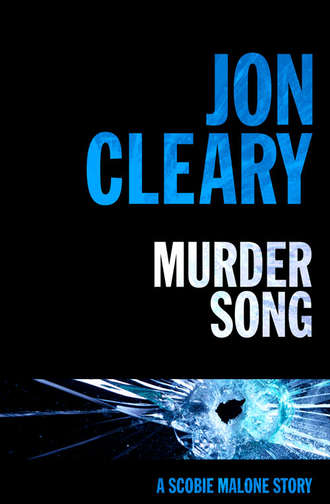
Полная версия
Murder Song
‘Where did you park your car?’
‘Quick, inside!’ He almost pushed her into the house, slammed the door shut behind them. ‘Is there anyone here?’
‘Of course not.’ She wanted to laugh at the melodramatic way he was acting; but reason told her he would not be acting like this without cause. ‘That’s why I suggested we come here. I don’t want to be found out, any more than you do. Now what’s this all about?’
He took off his hat and now she saw clearly the worry and concern in his bony face. She was a practical woman, even when wildly in love. She wanted to embrace him, hold him tight against her till she could feel the hardening of him; but, as always, she first wanted to know exactly where she was. The actual place didn’t matter, the situation did.
‘Has Philip found out about us? Has he been on to you?’
‘Christ, no! I could handle him.’ He took her by the hand and looked about him. He had met her here two or three times since they had fallen in love, but he still didn’t know his way round the house. It was one thing to know one’s way around a man’s wife, but another one altogether to invade his house willy-nilly. ‘Where can we go?’
She could feel the tension in him. ‘Relax, there’s no one here. Our cleaning woman comes in once a week when we’re not here, just to rearrange the dust. We’ll be all right,’ she said reassuringly. This was her first affair since she had married Philip, yet sometimes she felt so much more experienced than her lover. ‘Let’s go in here.’
She led him into the sun-room that looked out on to the back garden and the pool. As in almost every room in the house, there was a television set here; Philip never wanted to miss any screening of himself, no matter how brief. The screen now was, mercifully, grey and blank.
They sat down beside each other on a couch, still holding hands. He looked at their hands, then at her face. For weeks she had tried to put a name to that look: it was more than love. Suddenly she realized it was gratitude and the thought hurt her.
‘You’re a real comfort,’ he said. Then his grip tightened; she was always surprised at the strength in those big hands, they had often bruised her in their love-making. ‘I’m in trouble.’
‘Trouble?’ She had heard the rumours; even Philip had discussed them at the breakfast table as he read the financial pages. ‘You’ve never talked about the rumours –’
‘No, not them. Well, yes, maybe –’ A thought struck him, one that hadn’t occurred to him before. ‘A girl was murdered in our flat at the weekend.’
‘Our flat?’
Then she realized which one he meant. They had met there half a dozen times, he always making sure that none of his corporate executives ever tried to use it at the same time. She had felt sleazy at first, sharing a bed with God knew how many other lovers; the sheets were always clean, but she had seen the semen stains on the mattress, like dirty handprints. The flat was obviously as much a fringe benefit for the local executives as it was an accommodation for interstate and overseas executives. Then she had come to realize that all the beds they shared, with the exception of that here in her own house, would provoke a feeling of sleaze: she had never achieved the blind innocence of the really promiscuous. Even here she never took him into her and Philip’s bed; they always went into one of the spare bedrooms. As if he were no more than a visitor in her life. Which (and the thought chilled her) was all he might prove to be.
‘A girl – murdered? Which girl?’
‘One I used to know.’ He had known dozens, she knew that, though he had never boasted of them. Indeed, he had seemed almost ashamed of them, as if he would rather have come to her a virgin. You’re the only woman I’ve ever loved, he had told her the second time he had made love to her, and she had believed him. He was a liar and a robber in business; she had heard the Minister for Business Affairs describe him that way to Philip. Yet with her (or was it conceit on her part?) he was sometimes self-scaldingly truthful. As he was now: ‘I told her it was all over, but she didn’t want to believe it.’
‘Who killed her?’
‘How the hell – sorry. I don’t know. The police are working on it.’
‘Have they been to see you?’ He nodded. ‘What did you tell them?’
‘Nothing. That’s where I was stupid – they’ll find out eventually. All I wanted to do, I was thinking on the spur of the moment, was to protect you.’
‘You told them you didn’t know the girl?’
‘I even told them I knew nothing about the flat. I was bloody stupid, but I could see them asking other questions …’ She wondered if men in desperate love were always so naïve. But naïveté, of course, was a part of love: that was one of its weaknesses.
‘She was murdered at the weekend? Did they ask where you’d spent Saturday and Sunday?’
‘I told them I’d spent it with a lady I wasn’t going to name.’ He could be very old-fashioned at times; it was one of the more endearing things about him. She wondered if the original Brian Boru had been chivalrous towards women, but decided it was unlikely: Irish and medieval, he would have been too busy fighting, drinking and talking.
She squeezed his hand in thanks; then felt ashamed that so far her concern had been only for themselves. ‘How was the poor girl killed? Was it an intruder or someone?’
‘The police said she’d been shot, it looked as if it was from a neighbouring building.’
‘Did you and – did she go to the flat regularly?’
‘Fairly regularly – up till I met you.’
‘Did she have a husband or a boy-friend?’
He looked at her with admiration; he was recovering his composure. ‘You would make a good detective.’
She hadn’t meant to sound like that. ‘You don’t want me playing detective – there’ll be enough of the real ones. You should have told them the truth right from the start. In the long run it’s always best.’
‘You don’t believe that.’ He was gently cynical for the moment. ‘Not with a husband in politics. This is the same, darling. There are always cover-ups in politics. I was trying to cover up on you.’
So far she had felt little fear; she was more concerned for the situation he had got himself into by his lying to protect her. Six months ago she would have laughed at the idea that she would be having a passionate clandestine affair with a man who was hated, even despised, more than he was admired. She was forty-five years old and a grandmother, even if only recently. True, she was still beautiful in face and figure, thanks to Jane Fonda’s videos and her own genes; her parents, in their late sixties, were still a handsome enough pair to look good even in the candid camera shots on the social pages. She was intelligent, could be witty, if sometimes waspish, and always rated in the top five of the list of Most Popular Women of the Year. She was married to the most popular prime minister in decades, a man who fitted perfectly into the Image, a quality that, his minders told her, was the most necessary qualification for today’s leaders. She had two children, one of whom had fled the Image of his father and was now working in a merchant bank in London, the other married to a doctor and living in the Northern Territory, where the Image never penetrated; she had two grandchildren, both too young to know what an Image was even when it interrupted their cartoons on television. She was moral and decent and had taken seriously her task of trying to set an example. Then she had met Brian Boru, the last man she would have thought she would fall for, and had stepped off a cliff.
And now, somehow, she was involved in a murder. For the first time she was suddenly, terribly afraid; but for him: ‘Was it someone trying to kill you?’
He hesitated, took his hand away and put his arm along the back of the couch behind her. ‘I thought of that, only a few moments ago. I’ve got enemies, but I never thought anyone’d want to kill me. Christ, I hate violence!’
She was studying him, looking for the stranger she hadn’t yet discovered: she knew there was one hidden there in Brian Boru O’Brien. He had none of Philip’s classical good looks; the only feature that gave him distinction were the streaks of grey thick hair along his temples; there was no grey in her own equally thick dark hair, yet she was two years older than he. In public he had a certain arrogance to him, but never with her: not even at the moment they had first met, she remembered. He had been extraordinarily successful in a generation that, it seemed to her, had bred successful men like too-fecund rabbits. Yet, unlike the country’s nouveaux riches, he did not flash his wealth. Sure, he lived in luxury at the Congress, but no one could drive or sail past and say, with sour envy, ‘There’s that bastard O’Brien’s ten-million-dollar waterfront palace.’ He owned no yacht, no Learjet, not even a car; once, he told her, he had owned a Rolls-Royce in London, but in those days in the pop world you were expected to own a Rolls. It wasn’t so much a status symbol, he had said, as a jerk of the thumb at the Establishment who had thought up till then they had owned the world. The financial columnists told her that his dealings with the business Establishment in this country were done with a jerk of the thumb; yet he was always a gentleman of the old school with her, though her father had belonged to the Establishment. He was not a gentleman in bed, but it was her guess that no man worth his balls was ever a gentleman in bed, even one of the old school: she couldn’t imagine anything more boring than being made love to by a gentleman. Brian Boru was a sum of contradictions and she hadn’t yet got them all in place. There was still a stranger hidden amongst them.
‘I think you should go to the police and tell them the truth.’
He shook his head emphatically. ‘I’ll never tell them about you.’
‘I don’t want you to – I hope you don’t have to. But if you have to explain where you were Saturday and Sunday …’
They had spent the weekend at a hotel on the Central Coast; in winter it had few guests and certainly none who would recognize O’Brien. She had worn a blonde wig and the rimless fashion glasses she wore when watching movies or television; they made her look older, but, she had told herself, she wasn’t spending the weekend with some youth half her age. The wig had been a joke gift from Dolly Parton, whom Philip had invited to dinner at The Lodge during one of the singer’s tours: she had got on like a fond sister with Dolly, a woman who understood men. She had trimmed the wig; she hadn’t wanted some guest at the hotel asking her to sing ‘We Had All the Good Things Going’. Brian Boru had laughed at her disguise, but not in an offensive way; it had been a wonderful weekend. At forty-five she had been like a young girl in love for the first time, keeping him in bed till she had exhausted him and then, laughing, mothering him.
‘Go and see the police. You may need their protection.’
‘Darling, the police don’t protect you – it’s not their job. Not unless they want you as a witness.’
‘They protect me –’ But she knew that was different. ‘No, you’re right. But I still think you should go to them, tell them you knew – what was her name?’
‘Mardi Jack. She was a singer, you’d have never heard of her.’
‘I wish I hadn’t.’ She couldn’t help that: there are several sorts of love-bites.
He nodded, understanding. She wondered if he had been so understanding with his other women. ‘I first met her in London years ago, just after my second marriage broke up.’
God, you and your women! All at once, for the first time, she was jealous. But all she said was, ‘Don’t tell me any more about her.’
‘You’ll read all about her in the papers, I suppose.’
‘I’ll try not to.’ But she knew she would: you didn’t know what masochism was till you were truly in love.
‘The papers will get on to me as soon as they find out who owns the flat. It’s going to be pretty harsh from now on.’
He looked out at the grey garden. The rain had stopped, but the trees and bushes were still dripping. Some leaves floated on the pool like scabs on the dark green water; a magpie strutted importantly across the big lawn. More rain was coming up from the south-west, thick grey drapes of it. He understood weather; it was one of the reasons he had come home from England. He had been only thirty-five then, but already he had known that he could never grow old in the English climate. Now, suddenly, he was in a climate that frightened him.
‘I think we’d better not see each other for a while. Just in case …’ He put his hand on her shoulder. ‘I’d never forgive myself if you were hurt.’
‘I’m going to be hurt if I can’t see you.’ But she knew he was right. ‘How did we two fall so much in love?’
3
It was the next afternoon, Tuesday, when Clements got the call from Ballistics. He listened to what they had to tell him; then he hung up and came into Malone’s office. Malone was reading the running sheets of three other cases being handled by Homicide in Southern Region. When the Department had been regionalized almost two years ago, no one had quite been able to work out how the State had been cut up; it had been described as a cross between a jigsaw and a gerrymander, with no winners. Southern Region covered most of Sydney south of the harbour, then ran in a narrow strip about a hundred and eighty kilometres down the coast, then cut in an almost straight line across the State to the border with South Australia, taking in the whole of the area down to the Victorian border. On the map on Malone’s office wall it looked like a huge axe stood on its head. An axe that many, including Malone, would like to have buried in the heads of the planners who had devised the regional plan.
Malone threw down the running sheets. ‘Well, what have you got?’
‘Ballistics. They match, all three bullets are from the same rifle. Jason James says they’re .243s, probably fired from a Winchester, but maybe a Tikka or one of the other European guns. He knows his guns, that kid.’
‘Interesting,’ said Malone. ‘But where does that leave us? Three people bumped off in three different locations by the same hitman. Did they know each other?’
‘I haven’t a clue.’ It was a cliché no policeman would ever repeat at a press conference.
‘Who would want to shoot a construction worker, a desk cop and a second-rate singer?’ Malone turned to look at the second map on his wall, one of metropolitan Sydney. ‘Those locations are all ten or twelve kilometres apart – Parramatta is more than that from Clarence Street. Where did the construction bloke live?’
‘I’m not sure. Somewhere down on the Illawarra line. We didn’t handle that one, the guys from Chatswood did it. We know where Terry Sugar and Mardi Jack lived. Can we tie O’Brien into that? I mean, say he was meant to be the target and not the girl?’
Malone shook his head. ‘That connection would be even further out than with the girl. If he was meant to be the target, how come the killer shot the girl by mistake? If he’s a pro, that is.’
‘I was at the flat before you, Scobie. The lights were still on. When the cleaning lady phoned in, they told her not to touch anything. She didn’t. There were two table lamps on, that was all – both against the inside wall. Mardi Jack was in pants and her hair was cut short – against the light she could have been mistaken for a man.’
‘Even through a ’scope?’
‘We don’t know the circumstances, maybe the guy thought he was gunna be disturbed and had to hurry things. There’s a security patrol checks all those buildings on that side of Kent Street every two hours.’
‘The roof-tops, too?’
‘No-o,’ Clements admitted grudgingly. ‘Look, I know I’m trying to drag O’Brien into this. I’d like to think he was the intended target. That’ll be a bloody sight easier than trying to nail him as the guy who hired the hitman to hurt Mardi Jack.’
‘You’re looking for an easy way out.’
Clements nodded. ‘It’s the weather. I’m sick of getting a wet arse. I’d just like to sit here and have the case come in and drop itself in my lap.’
Then Malone’s phone rang and he picked it up. It was Chief Superintendent Danforth. ‘Can you pop into my office, Scobie? I’d like to see you.’
‘Right now, Harry?’
‘Now, Scobie. I’ve got Sergeant Chew here with me from Northern Region and Sergeant Ludke from Parramatta.’
Malone hung up, cursing softly. Harry Danforth was one of the old-style cops who believed that the operative word in the phrase police force was the last word. He had been noted for his stand-over tactics; he never went in for strategy, because he didn’t know what it meant. Twice there had been departmental charges of corruption against him, but Internal Affairs had never been able to prove anything. He had remained under suspicion and had been offered the opportunity to resign on full pension, but he had refused. He was within a year now of the retiring age of sixty-five and the Department had, in its own fit of resignation, solved the problem of Harry Danforth by promoting him to chief superintendent and moving him upwards out of harm’s and the public’s way. He had an office in Police Centre and the title of Crime Co-ordinator, a caption no one quite understood but which was thought, in view of his past history, an apt description.
‘Danforth wants to see me. He’s got Jack Chew and Hans Ludke with him.’
Clements raised his eyebrows. ‘Maybe we’re gunna draw a prize. Maybe they’ve got some connection.’
‘Now all we have to do is link it with Mardi Jack. While I’m gone, send someone down to one of the newspapers and have them dig out a photo of Brian Boru. Then have them go back to The Warehouse and go through all the tenants there, the permanent residents and the companies that own flats there, and show ’em O’Brien’s picture. If he’s used that flat at all, he’d have to have met someone going up and down in the lift.’
‘You don’t believe he didn’t know Mardi Jack?’
‘No. Do you?’
‘No,’ said Clements. ‘I’d never back a horse on intuition. But I’d lay money my intuition is right about him. He’s a born liar. I’m never wrong, tipping them.’
‘I’ll take you any day over forensic evidence,’ said Malone and went out of his office.
Chief Superintendent Harry Danforth was a big man, but most of his muscle now was fat. He had a pink, mottled face and cunning rather than shrewd eyes; he had a short-back-and-sides haircut and a voice foggy with years of free whiskies and cartons of purloined cigarettes. He was the last of his kind, out of place in the bright clean clinic that was Police Centre. He still had the suggestion about him of dark walls and fly-spattered lights and grime of old police stations.
‘You know Jack Chew and Hans Ludke?’
Malone had met Ludke on only one or two occasions; he was German-born but looked Latin: tall and dark with a bony handsome face and thick finger-waved hair that Malone thought had gone out with the advent of unisex salons. He had the reputation of being a good honest cop and a hard worker.
Jack Chew was an Australian-born Chinese, compactly built and with a face that, Malone was sure, had an acquired Oriental inscrutability. Russ Clements had once worked on a case with him and had come back with a story of Chew’s approach. The suspect, a part-Aboriginal, had taken one look at Chew, but the Chinese had got in first: ‘No Charlie Chan jokes or I’ll run you in for obscene language.’
‘What fucking obscene language?’
‘That’ll do for starters,’ Chew had said and grinned at Clements. ‘They fall for it every time.’
Malone said hullo to the two detectives and sat down. ‘What’s on, Chief?’
There were times when Danforth liked to be reminded, and have others reminded, of his rank. He was not unaware of his low standing with younger officers, but he was too lazy to attempt any strict discipline. Malone knew that so long as one touched the forelock occasionally, Danforth could be handled.
‘The Assistant Commissioner, Crime, has put me in charge of these three murders. Two of the victims were hit by the same rifle.’
‘So was the third,’ said Malone. ‘I just got the results from Ballistics.’
Chew and Ludke looked at each other, then all three officers looked at Danforth. He ran a ham of a hand over his head; it was a habit, as if he were trying to push his thoughts into some sort of working order. ‘Well, it looks like we’ve got something, doesn’t it?’
What? Malone wanted to ask.
‘Now we might be able to get somewhere.’ Danforth leaned forward on his desk. ‘You men will work independently on your own cases, okay? But you’ll send me copies of your running sheets each day and I’ll have ’em co-ordinated.’
‘What have you fellers got so far?’ Malone asked.
‘Not much,’ said Ludke and handed Malone a copy of his running sheets. ‘Everything’s in there, Terry Sugar had had no threats. Matter of fact, he was probably the most popular cop in the district. He had no connection, as far as we can trace, with any crims, drug pushers, scum like that. His family life was happy – his wife says she’d have known if he was carrying on with any other woman. There’s no motive so far, none that we can see.’
Malone glanced at the brief history of the life and death of Terence Ronald Sugar. Born 16 January 1945, two years in a factory after leaving high school, enlisted as a police cadet February 1965, steady promotion but career indistinguished except for two commendations for bravery … ‘How did he get on with the Asians out your way? You have some Vietnamese gangs out there.’
‘He wouldn’t have come in contact with them unless they were brought in and charged. The gangs have only started to operate in the last two or three years. He’d been on the desk all that time.’
‘They were my first suspects,’ said Danforth, putting in his two cents worth; it was worth no more. He had no time for anyone who wasn’t white, preferably of British stock and Protestant. He would never understand how Jack Chew, a Chink, had risen to be a sergeant. Chinese should only run restaurants or market gardens.
Chew passed over his sheets to Malone. ‘My guy is just as unexciting. He’d led a pretty nomadic life –’
‘What’s that?’ said Danforth, who had never learned to hide his ignorance.
‘Wandering. A drifter,’ said Chew with Oriental patience. ‘But once he married, he settled down, was a good husband and provider. As far as his wife knows and as far as we can find out, he never fooled around with other women. He was a good-looking guy and he was popular with the women at the leagues club near where he lived. But it never went beyond some mild flirting. No jealous husbands or boy-friends. The main point is, he had no connection with Terry Sugar, at least not for twenty years or more.’
‘What was the connection then?’
Chew nodded at the sheets in Malone’s hand. ‘It’s all in there. Compare the two of them.’
Malone saw it at once: Enlisted as a police cadet, February 1965. ‘He was at the academy? Harry Gardner?’
‘He dropped out as soon as he’d finished the course and then went walkabout for five years all over Australia.’
‘Where are your sheets?’ said Danforth to Malone.
‘You didn’t tell me to bring them –’ Malone was trying to picture the academy classes of twenty-four years ago. ‘I remember him now – dimly. He was in my group … Jesus!’
‘You remembered something?’ said Ludke.
‘There is a connection with my case. Mardi Jack, my girl, wasn’t the target.’ Russ Clements had been right after all. He told them about his visit to Brian Boru O’Brien. ‘One of his companies owns the flat where the murder happened. The killer was expecting O’Brien to be there.’
‘So?’ said Chew.
‘Terry Sugar, Gardner and O’Brien were all at the academy at the same time. They were all in my group.’
Danforth and the two junior officers sat back, saying nothing. Then Hans Ludke broke the silence: ‘Does that put you on the hitman’s list, too?’
Chapter Four









